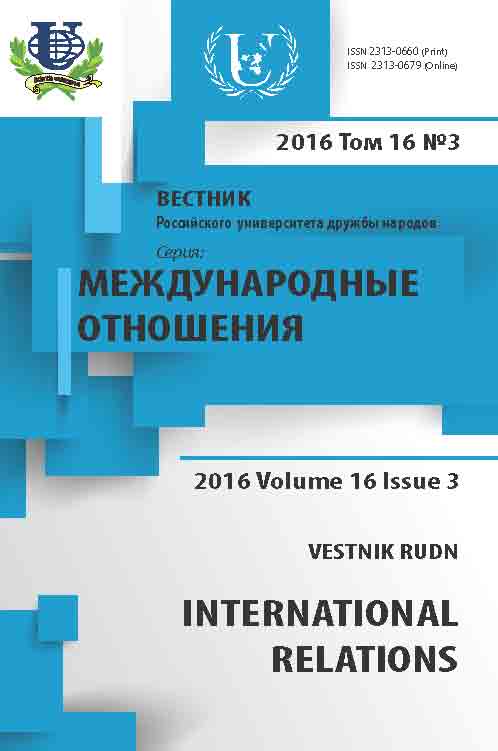French-Armenian Privileged Relationships: an Attempt to Use Applied Analysis
- Authors: Khachaturyan D.A.1
-
Affiliations:
- RUDN University
- Issue: Vol 16, No 3 (2016): International Conflicts: Quo Vadis?
- Pages: 538-548
- Section: Articles
- URL: https://journals.rudn.ru/international-relations/article/view/14770
Cite item
Full Text
Abstract
France takes a priority position in the foreign policy of Armenia. Bilateral relations are at high level and both countries characterize them as privileged relationships. To clarify the structure of relations between the countries, the author realizes a content analysis of the activity reports of the Ministry of Foreign Affairs of Armenia, quantitative analysis of the bilateral visits and meetings, friendship groups at the parliament of France, decentralized cooperation, as well as vote in the UN General Assembly and cooperation at the PACE are analyzed. Armenian-French privileged relationships correspond to the coincidence of more than half of the voting of the countries in the UN General Assembly. Regular visits of the President, the Minister of Foreign Affairs and the Minister of Diaspora of Armenia to France show the important French vector in foreign policy of Armenia. Due to the activities of the Armenian community of France, Armenia can rely on the group of supporters not only in the French Parliament, but, respectively, in the PACE, the European Parliament, etc., and decentralized co-operation with France develops dynamically and is not inferior to the interaction of Armenia with other countries in this area.
About the authors
David Anatolievich Khachaturyan
RUDN University
Author for correspondence.
Email: 1042145106@pfur.ru
Moscow, Russia
References
- Akopyan, E.G. (2015). Osnovnye napravleniya razvitiya dvustoronnikh otnoshenii Respubliki Armeniya i Frantsii (1992–2008 gg.). [Main directions of development of bilateral relations of the Republic of Armenia and France] Dissertatsiya na soiskanie stepeni kandidata istoricheskikh nauk. Nizhnii Novgorod.
- Bolgova, I.V. (2008). Politika Evropeiskogo Soyuza na Yuzhnom Kavkaze [The European Union's policy in the South Caucasus]. Kavkazskii sbornik, 5 (37), pp. 338-350.
- Galstyan, A.S. (2012). Armyanskoe lobbi - vazhnyi faktor mirovoi politiki [The Armenian lobby - an important factor in world politics]. Voprosy istorii, mezhdunarodnykh otnoshenii i dokumentovedeniya: sbornik materialov Vseross2iiskoi molodezhnoi nauchnoi konferentsii (18–20 aprelya 2012 g.) / nauch. red. P.P. Rumyantsev. Tomsk: Tomskii gosudarstvennyi universitet, 8, pp. 183-186.
- Degterev, D.A. (2015). Kolichestvennye metody v mezhdunarodnykh issledovaniyakh [Quantitative methods in international studies]. Mezhdunarodnye processy, 13(2), pp. 35-54.
- Degterev. D.A. (2014). Mehanizmy prinjatija reshenij v mezhdunarodnyh organizacijah i kollektivnyh nadnacional'nyh organah [Decision-making mechanisms in international organizations and collective supranational bodies]. Vestnik Sankt-Peterburgskogo universiteta. Serija 14: Pravo, 1, pp. 88-96.
- Degterev, D.A., Degterev, A.Kh., Nikulin, M.A., Oganesyan, A.L. (2014). Prikladnoi analiz vneshnei politiki stran SNG [Applied analysis of the foreign policy of CIS countries]. Vestnik RUDN. Seriya «Mezhdunarodnye otnosheniya», 4, pp. 176-184.
- Zvereva, T.V. (2014). Osnovnye napravleniya vneshnei politiki Frantsii v usloviyakh globalizatsii, [Main directions of foreign policy of France in the context of globalization], Dissertatsiya na soiskanie stepeni doktora politicheskikh nauk. Moscow.
- Krtyan, L.A. (2010). Osobennosti institutsional'noi struktury armyanskoi diaspory Frantsii. [Some features of the institutional structure of the Armenian diaspora in France]. Vestnik Nizhegorodskogo universiteta im. N.I. Lobachevskogo, 6, pp. 301–305.
- Krtyan, L.A. (2011). Vliyanie armyanskoi diaspory na protsess priznaniya Frantsuzskoi Respublikoi genotsida armyan v Ottomanskoi imperii [Influence of the Armenian Diaspora on the process of recognition of the Armenian Genocide in the Ottoman Empire by the French Republic]. Vlast', 2, pp. 159-161.
- Khodzhayan, K.G. (2011). Rol' armyanskoi obshchiny v formirovanii pozitsii Frantsii v otnoshenii evrointegratsionnykh protsessov Turtsii. [The Role of the Armenian Community in Developing the Disposition of France to Euro-integration Processes in Turkey]. Herald of the Social Sciences, 1-2, pp. 103-108.
- Khodzhayan, K.G., 2015. Vopros kriminalizatsii otritsaniya genotsida armyan vo frantsuzsko-turetskikh otnosheniyakh. [Armenian Genocide Denial Criminalization Issue in Franco-Turkish Relations]. Herald of the Social Sciences, 1, pp. 70-76.
- Duclert, V. (2013). Faut-il une loi contre le négationnisme du génocide des Arméniens? Un raisonnement historien sur le tournant de 2012. Partie I: Vie et mort de la loi Boyer. Histoire@Politique, 20, pp. 181-230.
- Duclert. V. (2013a). Faut-il une loi contre le négationnisme du génocide des Arméniens? Un raisonnement historien sur le tournant de 2012. Partie II: Les pouvoirs de la recherche. Histoire@Politique, 21, pp. 167-192.
- Marian, M., Makarian, Ch. (2011). Les Arméniens de France et la Turquie: la possibilité d'un dialogue?. Note de l’Ifri franco-turque, 5. URL: https://www.ifri.org/sites/default/files/atoms/files/notefrancoturque5marianmakarian1.pdf (accessed: 08.07.2016).
- Marian, M. (2012). Loi de pénalisation du génocide arménien: le mauvais fruit de l'immobilisme du gouvernement turc. Esprit, 382 (2), pp. 6-9.
- Masseret, O. (2001). «La France reconnaît le génocide arménien de 1915». Loi pour la mémoire ou geste diplomatique?. Confluences Méditerranée, 39, pp. 141-152.
- Masseret, O. (2002). La reconnaissance par le Parlement français du génocide arménien de 1915. Vingtième Siècle. Revue d'histoire, 73, pp. 139-155.
- Ter Minassian, A. (2000). Les Arméniens de France: Les temps moderns. Paris.: Privat.
- Vaisse, J. (2008). Slamming the Sublime Porte? Challenges in French-Turkish Relations from Chirac to Sarkozy. The Brookings Institution. URL: https://www.brookings.edu/wp-content/uploads/2016/06/0128_turkey_vaisse.pdf (accessed: 08.07.2016).
- Baghdasaryan, T.(2014). Armenian-French cooperation in the military sphere during the period 1993-2013. KANTEGH. Articles, 1, pp. 42-51.











